Cảm ơn mọi người nhiều ạ.
Hãy nhập câu hỏi của bạn vào đây, nếu là tài khoản VIP, bạn sẽ được ưu tiên trả lời.


a: Thay x=0 và y=5 vào (d), ta được:
(m-2)x0+m=5
=>m=5
c: Để hai đườg song song thì m-2=2
hay m=4

Câu 10:
a: ĐKXĐ: \(\left\{{}\begin{matrix}x\notin\left\{2;-1\right\}\\y\ne-5\end{matrix}\right.\)
\(A=\dfrac{y+5}{x^2-4x+4}\cdot\dfrac{x^2-4}{x+1}\cdot\dfrac{x-2}{y+5}\)
\(=\dfrac{y+5}{y+5}\cdot\dfrac{\left(x^2-4\right)}{x^2-4x+4}\cdot\dfrac{x-2}{x+1}\)
\(=\dfrac{\left(x^2-4\right)\cdot\left(x-2\right)}{\left(x+1\right)\left(x^2-4x+4\right)}\)
\(=\dfrac{\left(x+2\right)\left(x-2\right)\cdot\left(x-2\right)}{\left(x+1\right)\left(x-2\right)^2}=\dfrac{x+2}{x+1}\)
b: \(A=\dfrac{x+2}{x+1}\)
=>A không phụ thuộc vào biến y
Khi x=1/2 thì \(A=\left(\dfrac{1}{2}+2\right):\left(\dfrac{1}{2}+1\right)=\dfrac{5}{2}:\dfrac{3}{2}=\dfrac{5}{2}\cdot\dfrac{2}{3}=\dfrac{5}{3}\)
Câu 12:
a: \(A=\dfrac{x}{x+3}+\dfrac{2x}{x-3}+\dfrac{9-3x^2}{x^2-9}\)
\(=\dfrac{x}{x+3}+\dfrac{2x}{x-3}+\dfrac{9-3x^2}{\left(x+3\right)\left(x-3\right)}\)
\(=\dfrac{x\left(x-3\right)+2x\left(x+3\right)+9-3x^2}{\left(x+3\right)\left(x-3\right)}\)
\(=\dfrac{x^2-3x+2x^2+6x+9-3x^2}{\left(x+3\right)\left(x-3\right)}\)
\(=\dfrac{3x+9}{\left(x+3\right)\left(x-3\right)}=\dfrac{3\left(x+3\right)}{\left(x+3\right)\left(x-3\right)}=\dfrac{3}{x-3}\)
b: Khi x=1 thì \(A=\dfrac{3}{1-3}=\dfrac{3}{-2}=-\dfrac{3}{2}\)
\(x+\dfrac{1}{3}=\dfrac{10}{3}\)
=>\(x=\dfrac{10}{3}-\dfrac{1}{3}\)
=>\(x=\dfrac{9}{3}=3\left(loại\right)\)
Vậy: Khi x=3 thì A không có giá trị
c: \(B=A\cdot\dfrac{x-3}{x^2-4x+5}\)
\(=\dfrac{3}{x-3}\cdot\dfrac{x-3}{x^2-4x+5}\)
\(=\dfrac{3}{x^2-4x+5}\)
\(x^2-4x+5=x^2-4x+4+1=\left(x-2\right)^2+1>=1\forall x\) thỏa mãn ĐKXĐ
=>\(B=\dfrac{3}{x^2-4x+5}< =\dfrac{3}{1}=3\forall x\) thỏa mãn ĐKXĐ
Dấu '=' xảy ra khi x-2=0
=>x=2

Câu 1.
Khi mở khóa K:
\(I_m=I_1=0,4A\)
Khi đóng khóa K:
\(I_m=I_1+I_2=0,6\Rightarrow I_2=0,2A\)
\(U_1=0,4\cdot5=2V\)
\(\Rightarrow U_2=U_1=2V\)
\(\Rightarrow U=U_1=U_2=2V\)
\(R_2=\dfrac{U_2}{I_2}=\dfrac{2}{0,2}=10\Omega\)

a: Xét tứ giác BFEC có
\(\widehat{BFC}=\widehat{BEC}=90^0\)
Do đó: BFEC là tứ giác nội tiếp



Đề 1:
Bài 1:
\(a,=\sqrt{\left(\sqrt{7}+1\right)^2}-\left|-1+\sqrt{7}\right|=\sqrt{7}+1-\sqrt{7}+1=2\\ b,=2\sqrt{2}-4\sqrt{2}-5\sqrt{2}+\dfrac{\sqrt{2}}{2}=\dfrac{\sqrt{2}}{2}-7\sqrt{2}=\dfrac{-13\sqrt{2}}{\sqrt{2}}\)
Bài 2:
\(PT\Leftrightarrow\sqrt{\left(x-\dfrac{1}{2}\right)^2}=\dfrac{1}{2}\Leftrightarrow\left|x-\dfrac{1}{2}\right|=\dfrac{1}{2}\Leftrightarrow\left[{}\begin{matrix}x=\dfrac{1}{2}+\dfrac{1}{2}=1\\x=-\dfrac{1}{2}+\dfrac{1}{2}=0\end{matrix}\right.\)
Bài 3:
\(a,M=\dfrac{a-2\sqrt{a}+1}{\sqrt{a}\left(\sqrt{a}-1\right)}\cdot\dfrac{2\sqrt{a}}{\left(\sqrt{a}-1\right)\left(\sqrt{a}+1\right)}=\dfrac{2\left(\sqrt{a}-1\right)^2}{\left(\sqrt{a}-1\right)^2\left(\sqrt{a}+1\right)}=\dfrac{2}{\sqrt{a}+1}\\ b,M< 1\Leftrightarrow\dfrac{2}{\sqrt{a}+1}-1< 0\Leftrightarrow\dfrac{1-\sqrt{a}}{\sqrt{a}+1}< 0\\ \Leftrightarrow1-\sqrt{a}< 0\left(\sqrt{a}+1>0\right)\\ \Leftrightarrow a>1\)

Bài 2:
a. Ý nghĩa:
- Điện trở định mức của biến trở con chạy là 100Ω
- Cường độ dòng điện định mức của biến trở con chạy là 2A.
b. HĐT lớn nhất: \(U=R.I=100.2=200V\)
c. Chiều dài dây dẫn: \(R=p\dfrac{l}{S}\Rightarrow l=\dfrac{R.S}{p}=\dfrac{100.2.10^{-6}}{0,5.10^{-6}}=400m\)

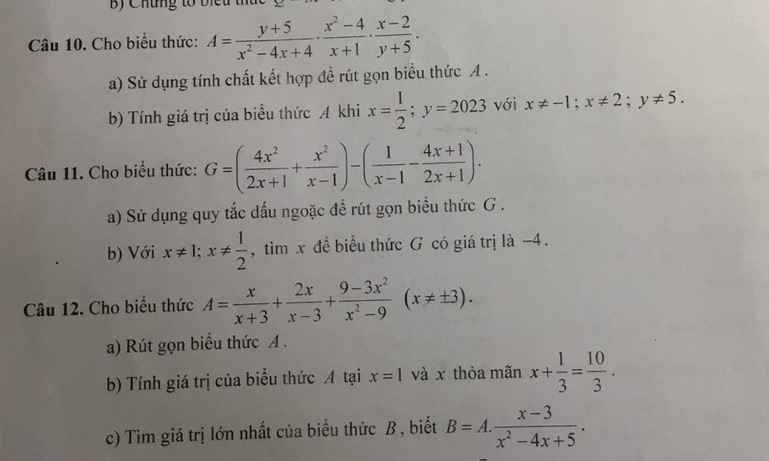
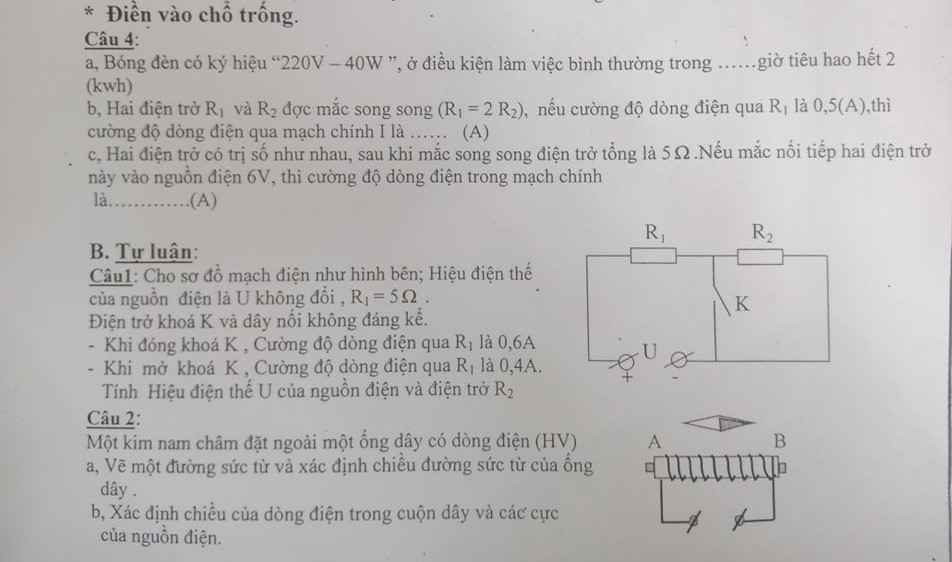
 người giúp em bài này được không ạ ....
người giúp em bài này được không ạ ....
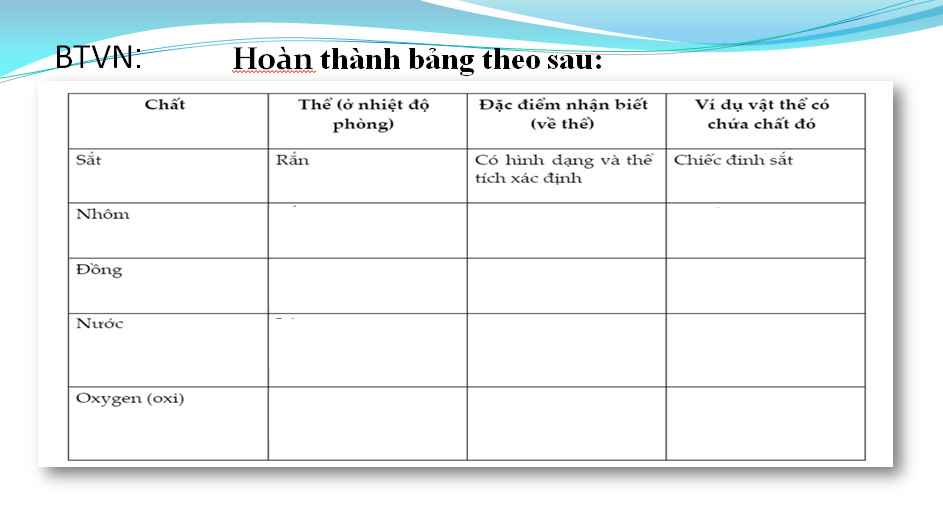

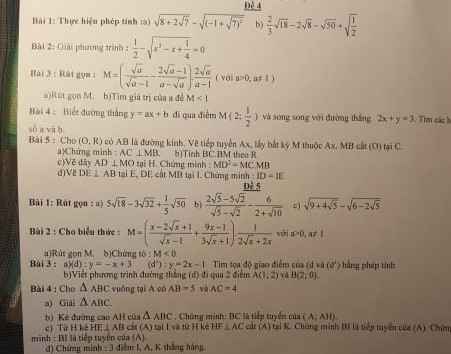
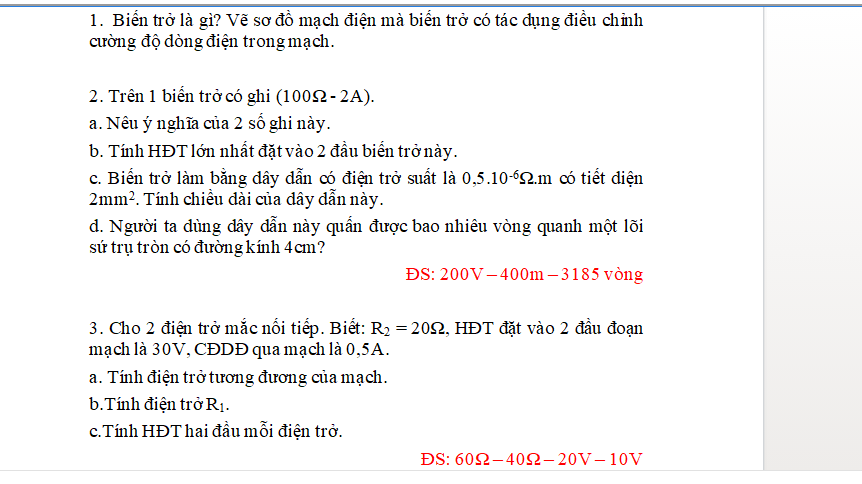

Bài 37:
\(\dfrac{\left|x-2016\right|+2017}{\left|x-2016\right|+2018}=1-\dfrac{1}{\left|x-2016\right|+2018}\ge1-\dfrac{1}{2018}=\dfrac{2017}{2018}\) (vì \(\left|x-2016\right|\ge0\))
-Dấu bằng xảy ra \(\Leftrightarrow x=2016\)
Bài 38:
-Áp dụng t/c của dãy tỉ số bằng nhau ta có:\(\dfrac{a+b-c}{c}=\dfrac{b+c-a}{a}=\dfrac{c+a-b}{b}=\dfrac{a+b-c+b+c-a+c+a-b}{c+a+b}=\dfrac{2\left(c+a+b\right)}{c+a+b}=2\)\(\Rightarrow\dfrac{a+b-c}{c}=2\Rightarrow a+b-c=2c\Rightarrow a+b+c=4c\)
\(\dfrac{b+c-a}{a}=2\Rightarrow b+c-a=2a\Rightarrow a+b+c=4a\)
\(\dfrac{c+a-b}{b}=2\Rightarrow c+a-b=2b\Rightarrow a+b+c=4b\)
\(\Rightarrow4a=4b=4c\Rightarrow a=b=c\)
\(B=\left(1+\dfrac{b}{a}\right)\left(1+\dfrac{a}{c}\right)\left(1+\dfrac{c}{b}\right)=\left(1+1\right)\left(1+1\right)\left(1+1\right)=2.2.2=8\)
Bài 39:
-Thay \(x=-2;y=\dfrac{1}{2}\) vào A ta được:\(A=-2.\dfrac{1}{2}+\left(-2\right)^2.\dfrac{1}{2^2}+\left(-2\right)^4.\dfrac{1}{2^4}+\left(-2\right)^6.\dfrac{1}{2^6}+...+\left(-2\right)^{2016}.\dfrac{1}{2^{2016}}+\left(-2\right)^{2018}.\dfrac{1}{2^{2018}}\)
\(=-1+2^2.\dfrac{1}{2^2}+2^4.\dfrac{1}{2^4}+2^6.\dfrac{1}{2^6}+...+2^{2016}.\dfrac{1}{2^{2016}}+2^{2018}.\dfrac{1}{2^{2018}}\)
\(=-1+1+1+1+...+1+1\) (có \(\dfrac{2018-2}{2}+1=1009\) số 1)
\(=-1.1009.1=1008\)
Bài 40:
\(25-y^2=8\left(x-2019\right)^2\)
\(\Rightarrow8\left(x-2019\right)^2-25=-y^2\le0\)
\(\Rightarrow0\le\left(x-2019\right)^2\le\dfrac{25}{8}\)
Mà x là số nguyên nên \(\left(x-2019\right)^2\) là số chính phương.
\(\Rightarrow\left(x-2019\right)^2=0\) hay \(\left(x-2019\right)^2=1\)
\(\Rightarrow x=2019\) hay \(x=2018\) hay \(x=2020\)
*\(x=2019\)\(\Rightarrow25-y^2=8\left(2019-2019\right)^2\Rightarrow25-y^2=0\Rightarrow y^2=25\Rightarrow y=5\) hay
\(y=-5\) (nhận)
*\(x=2018\)\(\Rightarrow25-y^2=8\left(2018-2019\right)^2\Rightarrow25-y^2=8\Rightarrow y^2=17\Rightarrow y=\sqrt{17}\)
hay \(y=-\sqrt{17}\)
*\(x=2020\)\(\Rightarrow25-y^2=8\left(2020-2019\right)^2\Rightarrow25-y^2=8\Rightarrow y^2=17\Rightarrow y=\sqrt{17}\)
hay \(y=-\sqrt{17}\)
-Vậy \(x=2019\) và \(y=5\) hay \(y=-5\)